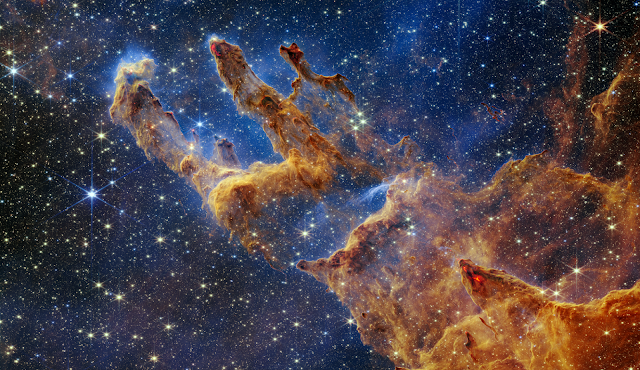The confirmation of life elsewhere in the universe would be regrettable
 |
| Pillars of Creation, photo by JWST |
The James Webb Space Telescope, or JWST, may have detected signs of life—at least microbial—on another world. From a philosophical pessimist perspective, confirmation of life elsewhere in the universe would be regrettable. A BBC report1 states that the JWST may have detected a molecule called dimethyl sulphide (DMS) on an exoplanet. On Earth, this is only produced by life. Researchers have also detected methane and CO2 on the planet's atmosphere.
This is yet to be confirmed and properly peer reviewed. Still, the mere possibility that life can actually arise on other parts of the universe, that it is a somewhat common event, would be a regrettable development from a cosmic pessimist or philosophical pessimist perspective. In the famous words of Schopenhauer, already quoted by me on different occasions:
If we picture to ourselves roughly as far as we can the sum total of misery, pain, and suffering of every kind on which the sun shines in its course, we shall admit that it would have been much better if it had been just as impossible for the sun to produce the phenomenon of life on earth as on the moon, and the surface of the earth, like that of the moon, had still been in a crystalline state.2
Even if these chemical processes observed in this particular exoplanet are due to microbial life, if microbial life is confirmed to exist elsewhere, then it's not much of a stretch to assume that Darwinian evolution can take place on other planets. And in an infinite or at least incomprehensibly large universe—not just in terms of space but also time—evolution can give rise to sentience, and thus, suffering, over and over again, as long as the universe is, at least in principle, able to sustain life.
Now, the existence of life elsewhere in the universe is believed by many to be almost obvious. But this belief, however well founded in numerical arguments such as the Drake equation and it's variants, is still a belief before there is empirical confirmation. The rare Earth hypothesis is equally well founded, maybe even more so.
And even the confirmation of microbial life elsewhere may still leave room to life being somewhat rare, especially more evolved multicellular organisms. At least that's what we can hope in case we have confirmation that JWST's observation is really the byproduct of life.
by Fernando Olszewski
References:
2. Arthur Schopenhauer, Parerga & Paralipomena, trans. by Payne, p. 299.

 Copy link
Copy link Twitter
Twitter Facebook
Facebook Whatsapp
Whatsapp Telegram
Telegram





